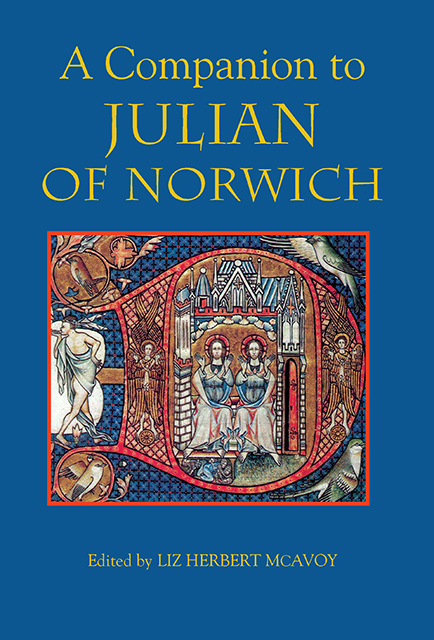3 - ‘No Such Sitting’: Julian Tropes the Trinity
Published online by Cambridge University Press: 10 March 2023
Summary
Devotion to the Trinity was growing in the fourteenth and fifteenth centuries: ‘In 1334 Pope John XXII set aside the first Sunday after Pentecost as Trinity Sunday. Increasing devotion to the Trinity can also be seen in the many prayers addressed to the Trinity’. Theology, however, did not necessarily keep pace. In his study of the doctrine of the Holy Trinity, Thomas Marsh has claimed: ‘In spite of the formal, notional acknowledgement of the doctrine, a real understanding of God as Trinity practically disappeared from the Christian consciousness of the Middle Ages’. This sweeping condemnation, however, ignores the notable contribution of Julian of Norwich, at the heart of whose Revelation of Love lies an attempt to come to terms with this central concept by radically reinventing it.
This preoccupation was not an overt part of her original reaction to her showings. As has been noted by others, the Short Text, A Vision Showed to a Devout Woman, makes only two references to the Trinity. In Section 12, on the Three Heavens (kept and expanded in Chapters 22 and 23 of A Revelation of Love) Julian sets up a series of correspondences with the three Persons of the Trinity:
For the firste heven, shewed Criste me his fadere, bot in na bodelye liknesse botte in his properte and in his wyrkinge […] And in this thre wordes – ‘It is a joye, a blisse, and ane endeles likinge to me’ – ware shewed to me thre hevens as thus: for the joye, I understode the plesance of the fadere; for the blisse, the wirshippe of the sone; and for the endeles likinge, the haly gaste. The fadere is plesed, the sone is worshipped, the haly gaste lykes. Jhesu wille that we take heede to this blisse that is in the blissedfulle trinite of oure salvation. (Vision, 12.9–11; 31–6)
And in Section 24, Julian alludes to the traditional Augustinian interpretation of the Trinity as might, wisdom and love, while stressing that the most immediate or accessible of these ‘propertees’, or attributes, is love, or the Holy Spirit:
Though the persones in the blissede trinite be alle even in properte, luffe was moste shewed to me, that it is moste nere to us alle. And of this knawinge er we moste blynde.
- Type
- Chapter
- Information
- A Companion to Julian of Norwich , pp. 42 - 52Publisher: Boydell & BrewerPrint publication year: 2008
- 2
- Cited by



